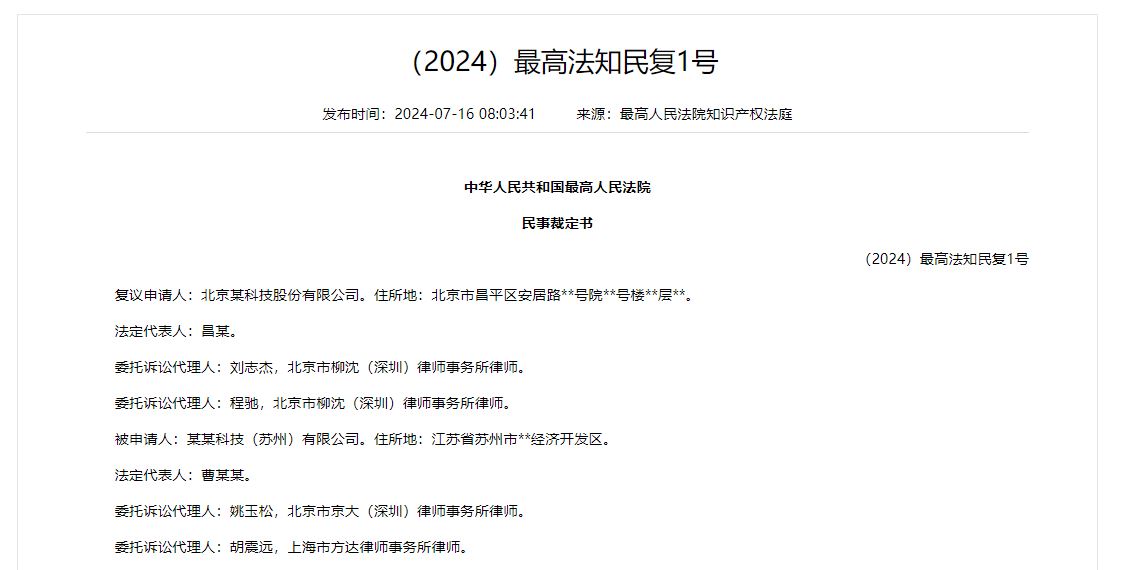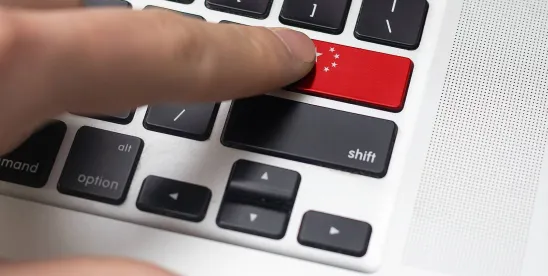On July 16, 2024, China’s Supreme People’s Court (SPC) announced the first case of behavioral preservation (preliminary injunction) in a patent infringement case since the “Decision of the Supreme People’s Court on Amending the Provisions of the Supreme People’s Court on Several Issues Concerning the Intellectual Property Court” came into effect on November 1, 2023.
On June 3, 2024, an unnamed Suzhou company applied to a local intermediate court for pre-litigation preservation, requesting an order that a Beijing company (believed to be Roborock) immediately stop manufacturing, selling, and promising to sell products that infringe the patent rights of the Suzhou company. The Suzhou company posted a 5 million RMB guarantee. The Court granted the request and the Beijing company appealed to the SPC.
The Quanzhou City (Fujian) Intermediate Court held that: based on the existing evidence, there is a high possibility that a Beijing company has committed patent infringement. At this time, it is the “618” e-commerce promotion period, and it is foreseeable that the alleged infringement will be large in scale and will expand. Therefore, it is urgent to stop possible infringement. If corresponding preservation measures are not taken, it will cause irreparable damage to the legitimate rights and interests of the Suzhou company, and the damage will be significantly greater than the damage caused to the Beijing company by taking behavioral preservation measures. In addition, the patented products involved in the case and the alleged infringing products are both vacuum robots, and do not have the attributes of products benefiting the social good and therefore, taking behavioral preservation measures will not harm the public interest.
The SPC reversed.
On appeal, the Beijing company argued that the patent right in the case was not stable and had the possibility of being invalidated, the alleged infringing technical solution did not fall within the scope of protection of the patent right in the case; and the application submitted by the Suzhou company did not meet the conditions of “urgency”, “balance of interests” and “social public interest.”
The SPC explained:
First of all, the pre-litigation behavior preservation in this case does not meet the prerequisite of “emergency situation.” “Emergency situation” usually refers to situations where failure to take behavior preservation measures immediately will be sufficient to cause the loss of the applicant’s rights, a sharp drop in the value of rights, and the imminent infringement of personal rights and other irreparable damage to interests. In this case, the application of the Suzhou company was based on a dispute over infringement of invention patents. The alleged infringement generally does not cause the patent rights involved to be lost or the value of rights to be irreparably damaged, nor does it infringe the personal rights of the Suzhou company. Moreover, according to the claim of the Suzhou company, the alleged infringement started as early as August 2023. After a Suzhou company discovered the alleged infringement, it did not file an application for behavior preservation until June 2024. During this period, there were also various promotional activities. The Suzhou company did not file an application for pre-litigation behavior preservation in a timely manner. The relevant facts show that there are no factors with strong timeliness in this case, and there is no urgency to stop the alleged infringement before litigation.
Secondly, the pre-litigation behavior preservation in this case does not meet some other requirements. First, in patent infringement cases, it is often necessary to conduct more complex technical comparisons to make an infringement judgment, and behavior preservation measures should usually be taken more cautiously. The validity of the patent right involved in the case is still stable, but the two parties in this case dispute the infringement. After preliminary review, this court believes that the factual basis for determining that the possibility of infringement is high at this stage is not clear. Second, when judging whether irreparable damage will be caused to the applicant, it should be focused on whether the relevant damage can be compensated by monetary compensation and whether there is a reasonable expectation of obtaining repayment. This case is a dispute over infringement of invention patents. The damage caused to the right holder by the infringement is usually the economic loss caused by the decline in product sales, and the economic loss can generally be compensated by requesting the accused infringer to bear the liability for damages through litigation. The existing evidence is also insufficient to prove that the alleged infringement will be difficult to control and will significantly increase the damage to the Suzhou company, and there is no evidence that the alleged infringement will lead to a significant reduction in the market share of the Suzhou company. Third, both parties are well-known companies in the vacuum robot industry. Taking pre-trial behavior preservation measures may also cause corresponding damage to the Beijing company. The existing evidence is not sufficient to prove that the damage caused to the Suzhou company by not taking pre-trial behavior preservation measures is higher than the damage caused to the Beijing company by taking pre-trial behavior preservation measures.
In addition, the alleged infringing products and the patented products involved in the case are both vacuum robots. There are sufficient alternative products on the market for consumers to choose from. They themselves do not have the attributes of products for social good and do not involve public health, environmental protection or other major social interests. Therefore, whether to allow pre-trial behavior preservation measures does not involve the issue of damaging social public interests. Although it can be said that it meets the requirements for pre-trial behavior preservation in terms of public interest considerations, given that the application of the Suzhou company does not meet the other statutory requirements mentioned above, its pre-trial behavior preservation application as a whole does not meet the statutory requirements for approval.
The case is (2024)最高法知民复1号 and a slightly redacted decision is available here (Chinese only).



 />i
/>i

